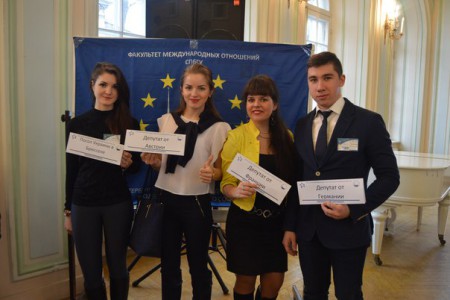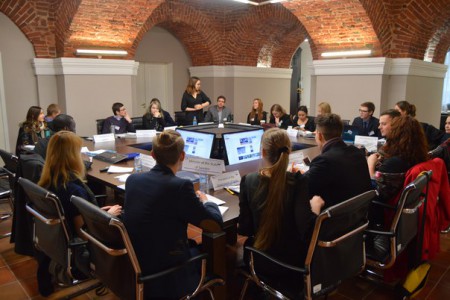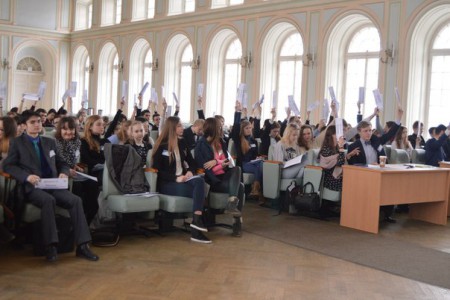Model of the EU 11-15 March 2016
The EU Model 11-15 March 2016
From 11th to 15th March, St. Petersburg University became the venue for the 10th St. Petersburg Student European Union Model. The roles of heads of state and government, ministers of EU member states, eurodeputies and commissioners, representatives of the diplomatic corps and journalists of independent media were tried on by more than 280 students and pupils from 10 Russian cities.
For the first time, the European Union Model was held in St. Petersburg State University on the initiative of the international relations teaching staff of SPbSU in 2006. For 10 years, it has been invariably attracting attention of international relations students, political scientists, journalists, economists of St. Petersburg and Russia, as well as high school students, who have been interested in the work of one of the largest integration groupings in the world from a young age. "The main task of the business game is to introduce students to the rules of decision-making and the fundamentals of European Union law. In the course of the Model, the participants develop drafts of directives and resolutions of the EU designed to answer the political questions of modern times, as they are understood in Europe,"-said the chairman of the Organizing Committee of the conference, associate professor of St. Petersburg State University, D.A. Levi.
At the opening of the conference, an associate professor of SPbSU, a representative of the Jean Monnet Center of Excellence N.G. Zaslavskaya drew the guests" attention to the importance of participating in political modeling conferences: "The importance of the academic component of the educational process shouldn"t be underestimated, however, such conferences help to understand the mechanisms of the organization"s work and decision-making process in the EU, learn to conduct bilateral and multilateral negotiations, because, when participating in the Model, it is not enough just to push your idea or bill through, it is important that it becomes acceptable for all participating countries, otherwise everyone will lose. All decisions in the European Union are taken by consensus; you must also strive for consensus."

The European Union is definitely the most successful international association in the world so far, having passed all the stages of integration. However, as the associate professor of SPbSU N.J. Markushina noted in her speech, there is no more good news. The EU has been facing problems caused by differences in the economic development of the participating countries and different views on the political structure since the mid-2000s. A significant blow for the European countries was the modern migration crisis. Will Europe cope with it?
Taking into account the main issues that concern European politicians, interesting and original topics on the agenda were proposed to the participants of the St. Petersburg Model for the work: standardization of legal approaches in the EU countries to providing mediation information services by transport aggregators (GetTaxi, Uber) and the development of the Frontex system by 2018 and its financing through national subsidies. The highest political body of the European Union, the European Council, which work at the Model is entirely in English, focused on the development of relations between the EU and the Eurasian Economic Union, in which Russia is an active participant.
Reference: Two conferences on political modeling are regularly held at St. Petersburg State University - the United Nations Model since 2004 and the European Union Model since 2006. Since 2013, an experiment is underway to launch a similar project to study the Eurasian integration model. Students of SPbSU and other universities of Russia, foreign students, as well as students of senior classes can become participants of the Models.


